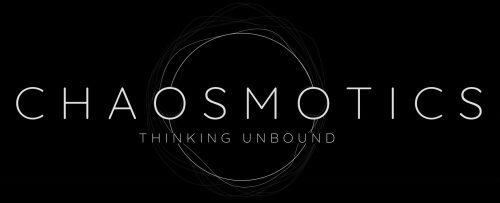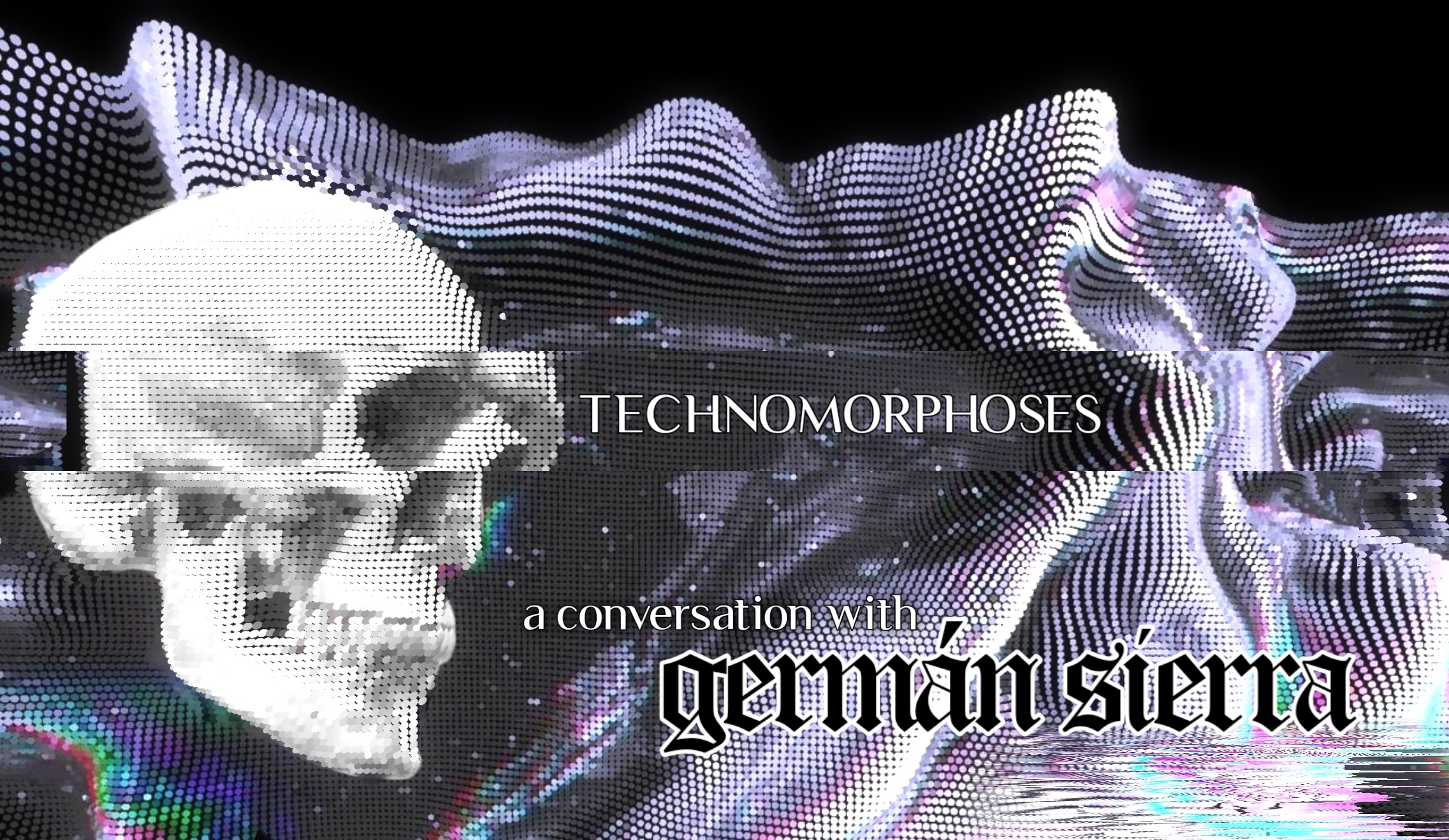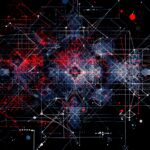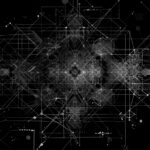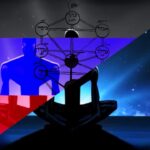In Kafka’s Metamorphosis there is no radical metamorphosis, but the installation of human consciousness in the body of an insect. In this way, Germán Sierra highlights the inability of contemporary thought to think adequately about change – an inability which, in the face of the mass and volume of transformations that our relationship with technology entails, limits the field of the possible to the known.
__________________________________________
C: Academically speaking you can be labeled as a scientist, but Germán Sierra is also a novelist, a thinker, and a poet. If it is true that one is a multitude, how did yours come to existence? Were there any fundamental encounters?
GS: My biography is a kind of cliché: I became a scientist because of my father’s influence—he was a neurologist and professor of physiology—, and we both actually collaborated for a long time. I’ve been also interested in literature for as long as I can remember, and probably started reading philosophers who seemed interesting to me as writers (Nietzsche, Cioran, Deleuze, Blanchot, Bataille…). I grew up as a “vicious” reader in the late 70’s, so the authors from the Latin American Boom and the French postmodernists were present everywhere… I wouldn’t say there were fundamental encounters, but more a widespread interest in discovering different viewpoints… So each time something struck me it was like opening a new world of possibilities—I just tried to keep as many as those doors open, instead of going “academically serious” into a particular discipline… which is other way to say that I get easily distracted by anything that looks strangely beautiful or weirdly interesting to me…
C: In reading your answer, I immediately thought about the value literature holds for one’s self-formation. Is there a kind of literature that looks strangely beautiful or weirdly interesting to you today?
GS: Yes, of course. I wouldn’t say it’s a specific kind of literature, but authors who approach literature as an open, powerful art form. Just to name a very few among the ones writing in this century: Blake Butler, Louis Armand, Joyelle McSweeney, Gary Shipley, Kenji Siratori, John Trefry, Aase Berg, Grant Maierhofer, Mike Corrao, Vi Khi Nao, William Vollmann, Gerald Murnane…
C: There would be a lot to say about each of them, but we’ll leave this for another conversation perhaps…
GS: And I would appreciate your recommendations about young Italian fiction writers and poets. I’m sure there are some new interesting publishers in Italy I’ve never heard about.
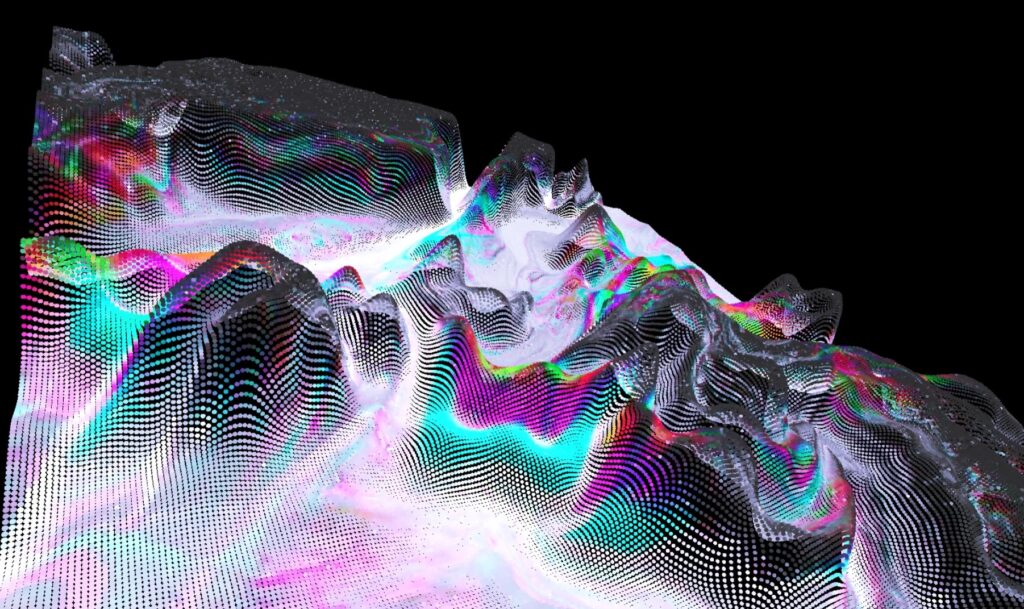
C: Fortunately, notwithstanding the foreseeable ailments of the publishing market, it can be said that literature is an art that has not yet ceased to interest and surprise. Speaking about this world, among the generation of writers you are often associated with, the Generación Nocilla, you are not the only one who comes from a scientific background – I can think of Agustín Fernández Mallo for instance – and your work heavily draws from, and expands on, it. In a sense, we might say that, in both of your cases, scientific thinking encounters the literary form out of a necessity: to conquer, or at least deal with, the complexity that marks contemporary times. Indeed, what emerges out from works such as The Artifact, but also other essays of yours, is that our epoch is the epoch of excessive multidimensionality and the overabundance of semiotic regimes, and that to confront ourselves with the real as a whole we cannot rely on a discipline alone; that is why neurology meets poetry, computer science meets literature, biology meets sociology, and cybernetics meets philosophy. Is the reality generated by the ever-accelerating production of new technologies and digital systems overwhelming us? How can we stay at its pace? In what ways the experimental forms of connection we hinted at might help us in making a sense of what is happening around us?
GS: We just can’t, but this is not necessarily a bad thing. Actually we never could, although there was this modern mythology about the perspective of knowing everything (or, at least, the “practical” side of everything), either as individuals—the modern myth of the intellectual, polymath, Renaissance men (rarely women), genius, etc.— or collectively —theories of everything, “complete” philosophical systems, etc.—. Among some scientists and within some scientific disciplines, the modern belief that “explaining everything” is just a matter of time is still running. However, I think that we’re becoming aware of the fact —and somehow accepting— that human knowledge is a very imperfect and partial model of reality, like the pre-moderns thought. It seems more shocking now not only because this idea contradicts the epistemic principles we were raised in, but also because our “not knowing” is now not only about faraway, abstract, or inapprehensible things (like galaxies, gods or bosons), but also about things we’ve made, about the same instruments we use to produce goods or learn about the world. Our technology is becoming unknowable, and this is scary.
As everybody else, I have no idea about how to deal with that. If I’m allowed to include a long quotation, I somehow agree with Mark Hansen when he writes that “while this environmental dimension has led some contemporary media theorists to characterize contemporary networked media as “inhuman” (Galloway and Thacker), I would strongly oppose any move to link the promise of new media to some fantasized transcendence of the human as a form of life and would argue instead that it introduces a massive complexification in the networks that now link not just machines with machines and humans with networked machines, but also humans with other humans. Within the hybrid domain opened by this complexification, the very possibility to rethink experience as such—and to intensify our specifically human experience—depends on our capacity to forge connections with the microtemporal processes that, despite evading the grasp of our conscious reflection and sense perception, nonetheless impact our sensory lives in significant ways.”

C: The becoming-unknowable of technology is something we should start to consider seriously. We are at once seduced and repelled by new technological devices and networked media, which are, say, cybernetically building a new multilayered environment we are somehow forced to inhabit but that we still need to make sense of, especially without us having complete control over its formation. Indeed, according to some perspectives of contemporary philosophy of technology is of the utmost importance to engage with a radically new evaluation of technology, or with the search for positive forms of connection with its drifts: I can think of Yuk Hui’s cosmotechnics, Peter Sloterdijk’s homeotechnology or Bernard Stiegler’s pharmacological approach, which fittingly echo Hansen’s idea of forging links with the microtemporal processes that impact on our experience via digital systems. For others, like Nick Land, control is a mere illusion and the interstices to which technology is binding human beings are growingly becoming narrow. It is precisely within this (necessarily) future-oriented speculation on the destiny of humanity that science fiction invaded as an uncanny guest a certain strand of the philosophical debate. Do you think it can really play an active role in this game? And, if so, in what way?
GS: Absolutely. Sci-fi (and other speculative genres such as horror) are at the centre of many philosophical speculations right now. A very good excample of that is how Steven Shaviro’s “Discognition” (a look at a series of science fiction narratives in order to raise questions about consciousness and thought) provides better insights about cognition than most scientific handbooks on the matter.
However, most philosophical approaches to sci-fi and horror (the aforementioned Shaviro’s book, Thacker on Lovecraft and Ligotti, Land on time-travel…) are still referring to conventional narratives which do not address the uncertainty of the subject’s radical mutation —like Kafka’s Metamorphosis does not reflect a real metamorphosis, but just a human mind trapped in a bug’s body.
I was recently reminded of a Paul Valery’s quote in a very thoughtful Twitter thread by Thomas Murphy: “All prediction is conservative, it demands that we be as we are in whatever future it constructs.” Most philosophical investigations of sci-fi do not overcome this “observer problem” —the observer never seems to change as the world changes.
This is one of my main objections to most current media theories: that those “possitive modes of connection” are human-essentialist, based on how we are now, not on the unknown and unknowable beings we would/might become in our interaction with technology. The consequence of thinking this way is that we stay defensive against real, unpredictable transformation. In this sense, David John Roden’s approach to the posthuman (both in his essay book and in his recent fiction “Snuff Memories”) and xenofeminism (specially the work by the Australian philosopher Amy Ireland) sound more contemporary to me.
I agree with Land’s “illusion of control” diagnosis, although I do not share his illusion of teleology…
C: This is really interesting. Taking clue from Thomas Nagel, we may say that we are still thinking about what it’s like to be a bat, which is to say that we are still wondering what would that mean for ourselves (as if we were – or become – a bat), so without really escaping an anthropocentric viewpoint. On the other hand, it’s not really easy to overcome this cognitive cage – Reza Negarestani’s neorationalistic endeavor might be seen an attempt to do that, but he still leaves room for (and I agree with him) a kind of coming back to the human, in his case by advocating for a reconceptualization or reengineering of the ways we express and think of it. For it has rather been humanism as a category of thought that somehow failed to acknowledge the true nature of human beings, which is actually, relying upon an anti-essentialistic framework, metamorphic and plastic at its core. Sloterdijk speaks of humanity as the art of making transitions and you seem to be suggesting that we should take a leap towards the most radical of the transitions, where the kind of being that we can become is to be reconceived dramatically: some post- and trans-humanistic takes on this topic are mainly concerned with the bodily and material configurations of this yet-to-be-known being, but what about its “spiritual” counterpart? Are we silently approaching the basest form of monism or is there still room for, to draw from Bergson, a kind of dynamic monism where mind and matter beget a synthesis of what we are? If so, how would it look like, with a specific reference to the “upgrades” of the former?
GS: At the end of the day I’m a materialist, so I really don’t think there’s an essential difference between minds and matter. I don’t consider minds just as a “property” or a “tendency” of matter, but as one of the ways matter and energy spontaneously might organize themselves under some specific conditions. Matter spontaneously organizes itself into different kinds of complex systems, and minds are among them. Those processes are neither totally random, nor deterministic. A radical transition would probably affect to different levels of organization, but accepting the unpredictability of its outcome doesn’t mean that humanity would necessarily become something completely different at all levels. Besides, humanity might eventually be a dead end in evolution, and what we call “reason” or “spirit”, a tiny, short-living spark of matter organization.
I’m also a non-reductionist, so I don’t think that minds could be explained solely by the laws of biology (many of which we don’t know yet), It is now generally accepted that living beings cannot be explained only by the laws of physics (of course, the laws of physics cannot be contradicted by living beings, and biology should not be contradicted when trying to investigate minds). So we could say that, in that sense, biology is already meta-physics, and a proper science of the mind would need to be be meta-biology.
Neorationalism is interesting to me as a speculative way to find some pathways towards new sciences of the mind. However, I do not think, as some philosophers do, that there’s an abstract, trascendental “reason” that could be (or ever was) separated from biology. Human reason will keep looping around the (everchanging) human, and it will be the main force driving human transformation. Even if cybernetics and computation prodedures became procedurally “independent” from humans, they still would be elements of the expanded human mind. This doesn’t mean that I exclude the possibility of a non-human mind, it’s just that I believe that it would be totally independent from the existence of humans.
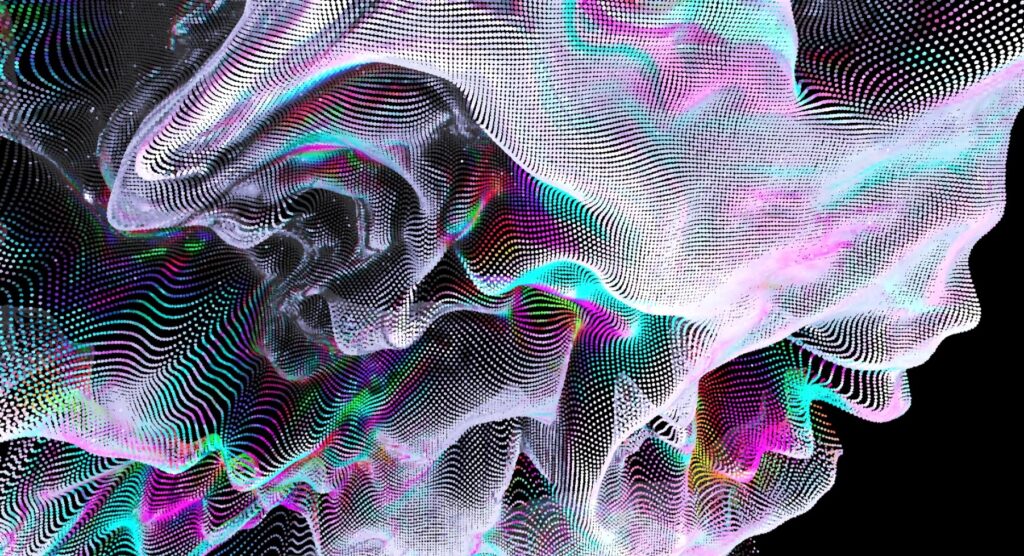
C: One of the topics that runs through The Artifact, perhaps more than others, is indeed that of the body or corporeality: with the development of the novel, we can see how a concept that might appear enclosed, like that of the body, is instead labile and even undergoes to a constant transformation. On the basis of such an estesiologic paradigm and of Plessnerian superimposition between body-that-I-am and body-that-I-have, I recall a brief passage from Le locataire by Roman Polanski:
«At what precise moment does an individual stop being who he thinks he is? Cut off my arm. I say, ‘Me and my arm’. You cut off my other arm. I say, ‘Me and my two arms’. You take out my stomach, my kidneys, assuming that were possible… And I say, ‘Me and my intestines’. And now, if you cut off my head… would I say, ‘Me and my head’ or ‘Me and my body’? What right has my head to call itself me? What right?»
In an epoch in which biotechnological blending seems to increasingly blur the boundaries of concepts such as I and body, is it still possible to draw a demarcation line to try to answer the questions – albeit rhetoric – of Trelkovsky? According to you, can this kind of escaping, on the part of the subject, from the ego and the body assume a metamorphic value and rewrite the limits of the subject itself?
GS: I often begin my neuroscience masters classes by telling my students that neuroscience is too brain-centered—which is of course a consequence of its methodology, but does not reflect very well how brains might actually work. So I have no doubt that my head has no more right to call itself me than my hand or my pancreas… however, the question I’ve been trying to address in some of my fiction is more about what is an individual body—like, where does it end? If I have a prosthesis, or a medical implant that’s required to stay alive, are they part of my body? Are they me? What about a biochemical implant like foreign DNA or RNA? What about a perception that changes the structure of many cell networks in my brain? I like Clark & Chalmers’ idea of the extended mind —I’d say “extended brain”, and why not “extended body”? Maybe the self and subjectivity are just sophisticated molecular tricks pulled by the brain because of the performative need to differentiate “self” from “non-self” the way the immune system does, and what we consider the “natural” limits of the body and the cognitive boundaries of the subject are just transitory territorial marks…
Even for most philosophers of becoming, metamorphosis implies transformation into something that is already known, or at least imagined —some kind of teleological or teleoplexic processes driven by trascendental attractors. Technoscience produces socially-acceptable models of what humanity might become —there should be a purpose for transformation. I am more interested in exploring the immanent spaces of possibilities (the adjacent possible, in Kaufmann’s words) that would lead the body/self to imagine itself not morphing into some unknown-yet-but-already-theoretically-existent-as-attractor extrapolated avatar, but slipping into the radical openness of the undetermined.
C: The reference to Stuart Kauffman is very interesting to me because it also brings into play the idea of sacredness. Much of Kauffman’s more popular and philosophical production discusses the adjacent possible, as a field of immanence, in terms of a kind of rediscovery, or rather a reinvention, of the sacred: our “finding ourselves at home”, both as humans and as biological systems, in a universe in continuous and indeterminable self-creation. It seems to open up a new notion of ineffability, where the future in the richness of its possibilities remains obscure and intangible until some of them are actualized; a new experience of faith beyond religion might be at stake here. Is this what you mean when you talk about slipping into the radically undetermined? Can there be room today for a rediscovery of faith as a form of non-invasive, contemplative knowledge?
GS: I guess this might be a provisional way out — something like the bright, flip side of Thacker’s horror of philosophy. I like Nicola Masciandaro’s writings because of his simultaneous takes on both sides.
I’ve had myself a “contemplative side” all my life, but I’m probably too skeptical and too restless to take it seriously enough…
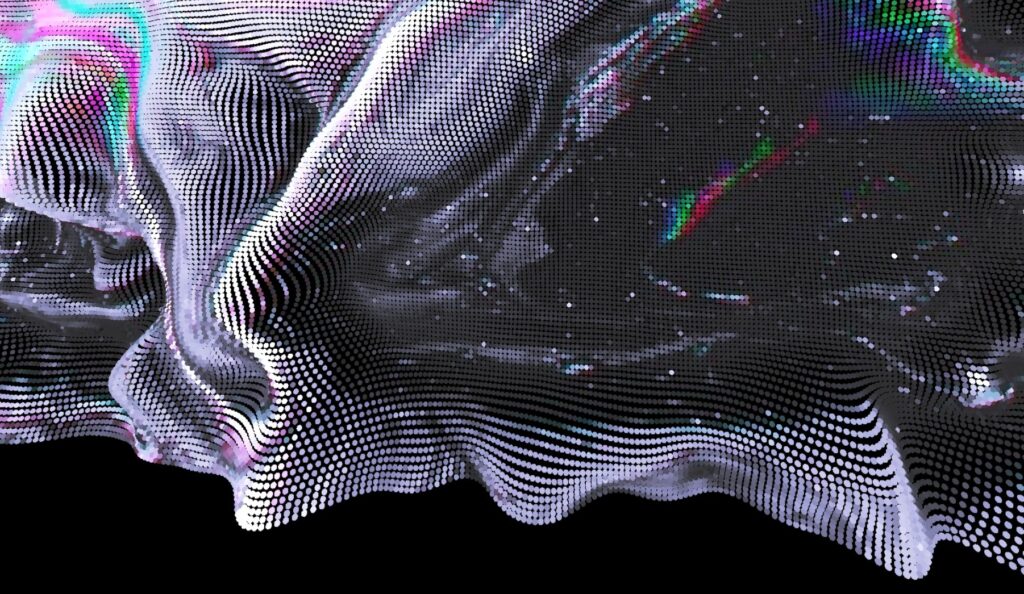
C: Words like “strange” and “indeterminate”, together with the antithesis between known and unknown, are central terms in one of the most interesting – at least in my opinion – contemporary treatments of the aesthetic dynamics of the weird: The Weird and the Eerie by Mark Fisher. In the text, it seems to emerge how at the heart of our experience of the world lies a latent, powerful eerie charge: if, as you argue, our knowledge of the world is unconsciously fragmentary and studded with epistemic gaps, then the feeling that “something is wrong” may be partly motivated by this constant failure of the presence of meaning. My question is the following: in what way can the awareness of this cognitive incompleteness, the surrender before the limitation of human peculiarities, shape our actions? Can this awareness operate a decentralization of subjectivity and take on a political meaning in some way?
GS: That might have been slowly happening for a while, but it’s difficult to appreciate because we’re too much embedded into representations of an obsolete and quickly collapsing social reality. It’s decentralized subjectivity acting as if the model of reality produced to integrate individually-complete actants wasn’t over. In my opinion, it will be hard to act meaningfully in politics until we don’t get to define what’s a polis now. Our idea of polis is too dependent on modern structures (nation-states, families, paid work, stable identity, “health”) which can’t represent or accommodate the currently evolving social conditions—but we don’t want to abandon them becacause they somehow worked for a long time, and we don’t know what comes after… We’re exprerimenting (albeit often not acknowledging) the decoupling of things that have been cognitively coupled for millennia, and, despite the general belief that we are “postmodern”, Bruno Latour seemed right when he said that we’ve never been modern.
Fake modernity worked, anyway, and we got some impressive techno-science and art, among many other things…
So most political actions (and actants) can’t detach themselves from pseudomodern, hierarchically-structured institutions (every social alternative ends by reproducing them, sometimes in a mock form), and they can’t avoid to seek power and influence through those structures (which might eventually be good in the short term, but interferes with other, more radical speculations).
This is, in my understanding, why some of Fisher’s insights and xenofeminist proposals are difficult to introduce in the current political practice. Just as an example, it is more likely for a marginalized community to fight for access to the perceived advantages of integration into a mainstream society, than taking the risk of imagining a real cognitive alternative. The problem is that the mainstream structures are collapsing now, and the advantages they were expecting (not only a higher stanrdad of living, but also cognitive and emotional ones) are not there anymore for anyone. We’re getting a low-cost dupe of a “modern society” that never existed, and most political actions are only targeted to make it available to everyone.
I have no good solution for that. I just keep thinking about it because I’m too skeptical and too restless…
C: Yes, answering the canonical question “What is to be done?”, translating into practice some, even brilliant, theoretical intuitions, seems to be one of the big rocks on which (post)modernity is clashing. Speaking of modernity and postmodernity, since you are quoting Latour, let me ask you one last question, still concerning The Artifact. According to Latour, modernity is made up of two groups of practices that coexist in virtue of, we might say, a sleight of hand: on the one hand, there is a work of translation that incessantly creates hybrids of nature and culture, on the other hand, there is a work of purification that defines two ontologically separate areas (human/non-human); while on the one hand, the work of mediation that assembles the hybrids is made invisible, on the other hand, an uncontrolled proliferation (of the hybrids) is allowed, of which, at the same time – within the constraints of modernity – the existence and possibility is denied. From these assumptions, which I share, can we say, according to you, that the area of the human has been constituted through a constant recourse to the non-human? In a sense, could we not say that the human being is essentially and constitutively hybrid? Is it not itself, perhaps, the greatest Artifact? I think I might guess your answer to this last question, but still am interested in seeing how you deal with it and/or whether you want to add something.
GS: The modern natural/artificial and human/non-human dualisms are as problematic as the mind/body question. All of them are rooted in a very anthropocentric and hardly scientific view of reality, yet they’re at the very core of modern science. Overcoming those dualisms seems essential not just for the future advancement of science, but also to fully understand and integrate our current knowledge of the world. Maybe we have not yet arrived to the point in which we could present coherent alternatives to all the main premises and axioms of modernity, so the present feels more transitory right now…
Yes, of course, humans are hybrid in many, many ways. We’re holobions and “holologons.” We’re made of foreign beings and we carry a lot of foreign DNA (viral and bacterial, at least) in our genome. We modify the world to make it available to us through our very limited sensory capacities. We make instruments and we are made of them and by them. We expect to become artifacts of our own making, but we actually exist as artifacts of the techniques we have adopted.

